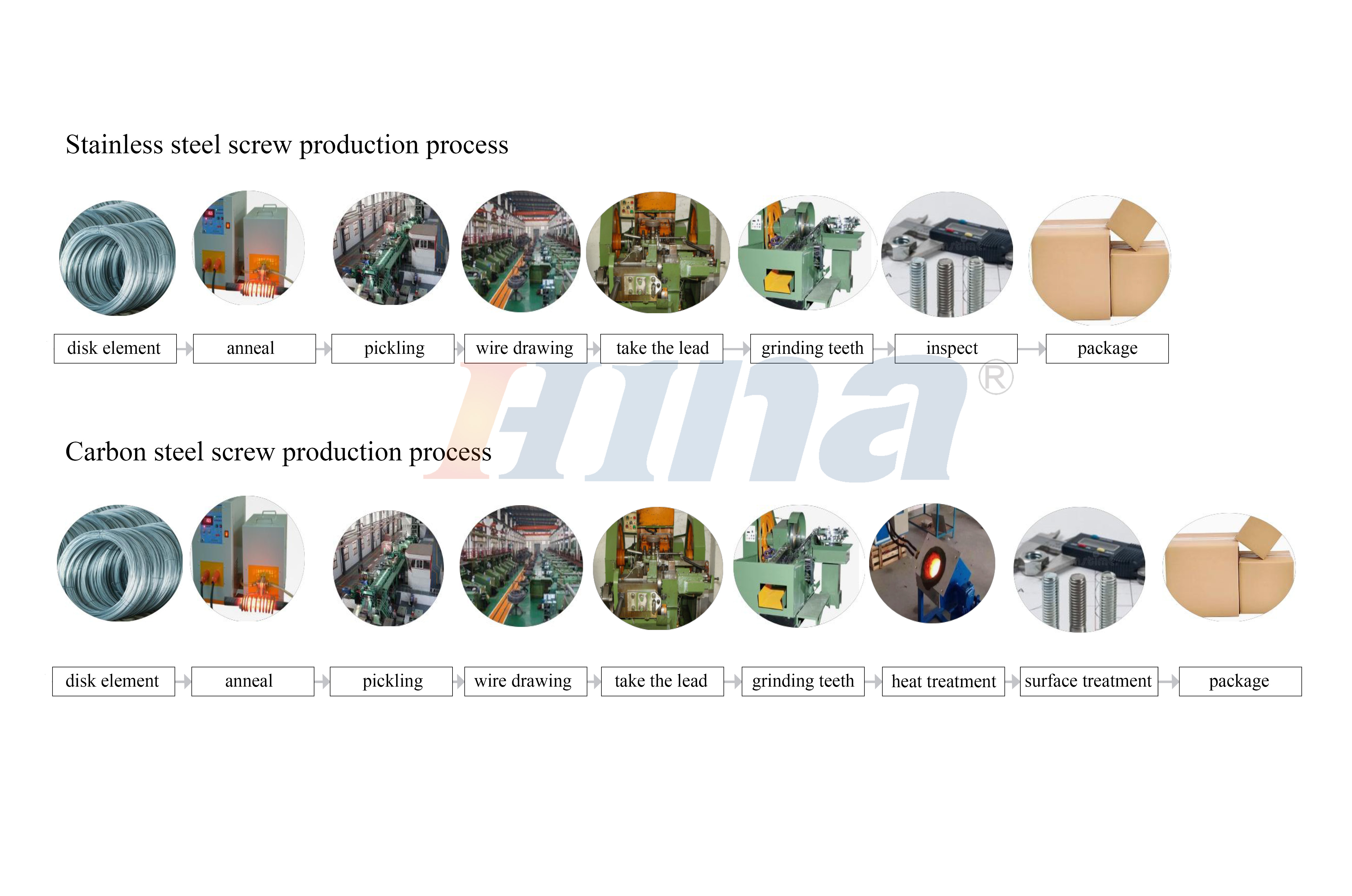- All
- Product Name
- Product Keyword
- Product Model
- Product Summary
- Product Description
- Multi Field Search
| Availability: | |
|---|---|
| Quantity: | |






DIN933
HNF
HNF2024120502
Features
Larger head: Compared with standard hexagonal bolts, heavy hexagonal bolts have thicker and larger heads, which enables them to provide a larger pressure-bearing area, thereby better dispersing the clamping force and suitable for connections that bear larger loads.
Higher strength: Usually made of medium carbon steel, alloy steel, stainless steel and other materials, after appropriate heat treatment or processing technology, it has higher strength and hardness and can meet the requirements of high-strength connections.
Specifications
Dimensions: Heavy hexagonal bolts have various sizes, with common imperial sizes ranging from 3/8 inches to 3 inches and metric sizes ranging from M12 to M36. Its specific dimensions include the bolt diameter, hexagonal head width across flats, hexagonal head width across corners, bolt length, etc. Different diameter and length combinations can meet various application scenarios.
Thread specifications: It can be equipped with a variety of different thread types, such as British coarse thread (UNC), British fine thread (UNF), metric coarse thread, metric fine thread, etc., to meet different connection requirements.




Used in construction, machinery, structural applications, and other areas where strong and durable fastening is required, especially for high-stress or load-bearing connections.
The heavy hex bolt is commonly used in industries like construction, shipbuilding, and heavy equipment manufacturing due to its ability to handle high forces and its robust design.
Haina is committed to providing customers with high-quality stainless steel standard fasteners and professional services to meet various engineering needs. We have a large amount of spot inventory to ensure fast delivery and save you waiting time. In addition, we provide the following value-added services to help your purchasing experience:
1. Free samples: provide samples for customer testing.
2. 3.1 Test report: quality test report that meets international standards.
3. Video factory inspection: support video factory inspection to demonstrate production process and quality management.
Advantages
- Sufficient inventory: quick response to order requirements.
- Quality assurance: strict quality control to ensure product reliability.
Haina is committed to providing efficient and high-quality fastener services.
What is the strongest strength bolt?
The strongest bolts are grade 12.9 bolts, made from alloy steel, with a tensile strength of up to 1,200 MPa.
What is the difference between a stud bolt and a heavy hex bolt?
A stud bolt is a threaded rod with nuts on both ends, used for flange connections, while a heavy hex bolt has a larger hexagonal head and is tightened with a wrench, typically used for structural and heavy-duty applications.
What is the difference between heavy hex and regular hex?
A heavy hex has a larger and thicker head and shank compared to a regular hex, providing greater strength and load-bearing capacity for heavy-duty applications.
Features
Larger head: Compared with standard hexagonal bolts, heavy hexagonal bolts have thicker and larger heads, which enables them to provide a larger pressure-bearing area, thereby better dispersing the clamping force and suitable for connections that bear larger loads.
Higher strength: Usually made of medium carbon steel, alloy steel, stainless steel and other materials, after appropriate heat treatment or processing technology, it has higher strength and hardness and can meet the requirements of high-strength connections.
Specifications
Dimensions: Heavy hexagonal bolts have various sizes, with common imperial sizes ranging from 3/8 inches to 3 inches and metric sizes ranging from M12 to M36. Its specific dimensions include the bolt diameter, hexagonal head width across flats, hexagonal head width across corners, bolt length, etc. Different diameter and length combinations can meet various application scenarios.
Thread specifications: It can be equipped with a variety of different thread types, such as British coarse thread (UNC), British fine thread (UNF), metric coarse thread, metric fine thread, etc., to meet different connection requirements.




Used in construction, machinery, structural applications, and other areas where strong and durable fastening is required, especially for high-stress or load-bearing connections.
The heavy hex bolt is commonly used in industries like construction, shipbuilding, and heavy equipment manufacturing due to its ability to handle high forces and its robust design.
Haina is committed to providing customers with high-quality stainless steel standard fasteners and professional services to meet various engineering needs. We have a large amount of spot inventory to ensure fast delivery and save you waiting time. In addition, we provide the following value-added services to help your purchasing experience:
1. Free samples: provide samples for customer testing.
2. 3.1 Test report: quality test report that meets international standards.
3. Video factory inspection: support video factory inspection to demonstrate production process and quality management.
Advantages
- Sufficient inventory: quick response to order requirements.
- Quality assurance: strict quality control to ensure product reliability.
Haina is committed to providing efficient and high-quality fastener services.
What is the strongest strength bolt?
The strongest bolts are grade 12.9 bolts, made from alloy steel, with a tensile strength of up to 1,200 MPa.
What is the difference between a stud bolt and a heavy hex bolt?
A stud bolt is a threaded rod with nuts on both ends, used for flange connections, while a heavy hex bolt has a larger hexagonal head and is tightened with a wrench, typically used for structural and heavy-duty applications.
What is the difference between heavy hex and regular hex?
A heavy hex has a larger and thicker head and shank compared to a regular hex, providing greater strength and load-bearing capacity for heavy-duty applications.